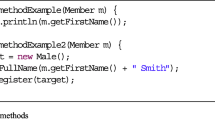Abstract
In consequence of changing requirements and technological progress, modeling languages are subject to change. When their metamodels are adapted to reflect those changes, existing models might become invalid. Manually migrating the models to the adapted metamodel is tedious. To substantially reduce effort, a number of approaches have been proposed to fully automate model migration. However, the evolution of modeling languages occasionally leads to metamodel changes for which the migration of models inherently cannot be fully automated. In these cases, the migration of models requires information which is not available in the model. If such changes are ignored or circumvented, they may lead to language erosion. In this paper, we formally characterize metamodel adaptations in terms of the effort needed for model migration. We focus on the problem of metamodel changes that prevent the automatic migration of models. We outline different possibilities to systematically cope with these kinds of metamodel changes.
Access this chapter
Tax calculation will be finalised at checkout
Purchases are for personal use only
Preview
Unable to display preview. Download preview PDF.
Similar content being viewed by others
References
Favre, J.M.: Languages evolve too! changing the software time scale. In: 8th International Workshop on Principles of Software Evolution (IWPSE), pp. 33–44. IEEE Computer Society, Los Alamitos (2005)
Herrmannsdoerfer, M., Benz, S., Juergens, E.: Automatability of Coupled Evolution of Metamodels and Models in Practice. In: Czarnecki, K., Ober, I., Bruel, J.-M., Uhl, A., Völter, M. (eds.) MODELS 2008. LNCS, vol. 5301, pp. 645–659. Springer, Heidelberg (2008)
Herrmannsdoerfer, M., Benz, S., Juergens, E.: COPE - Automating Coupled Evolution of Metamodels and Models. In: Drossopoulou, S. (ed.) ECOOP 2009. LNCS, vol. 5653, pp. 52–76. Springer, Heidelberg (2009)
Herrmannsdoerfer, M., Benz, S., Juergens, E.: COPE: A Language for the Coupled Evolution of Metamodels and Models. In: 1st International Workshop on Model Co-Evolution and Consistency Management, MCCM (2008)
Harel, D., Rumpe, B.: Meaningful modeling: what’s the semantics of ”semantics”? Computer 37(10), 64–72 (2004)
Rumpe, B.: A note on semantics (with an emphasis on UML). In: 2nd ECOOP Workshop on Precise Behavioral Semantics (1998)
Sprinkle, J., Karsai, G.: A domain-specific visual language for domain model evolution. Journal of Visual Languages and Computing 15, 291–307 (2004)
Becker, S., Gruschko, B., Goldschmidt, T., Koziolek, H.: A Process Model and Classification Scheme for Semi-Automatic Meta-Model Evolution. In: 1st Workshop MDD, SOA und IT-Management (MSI), GI, pp. 35–46. GiTO-Verlag (2007)
Gruschko, B., Kolovos, D., Paige, R.: Towards synchronizing models with evolving metamodels. In: International Workshop on Model-Driven Software Evolution, MoDSE (2007)
Cicchetti, A., Ruscio, D.D., Eramo, R., Pierantonio, A.: Automating co-evolution in model-driven engineering. In: Ceballos, S. (ed.) 12th International Enterprise Distributed Object Computing Conference (EDOC). IEEE Computer Society, Los Alamitos (2008)
Cicchetti, A., Ruscio, D.D., Pierantonio, A.: Managing dependent changes in coupled evolution. In: Paige, R.F. (ed.) ICMT 2009. LNCS, vol. 5563, pp. 35–51. Springer, Heidelberg (2009)
Garcés, K., Jouault, F., Cointe, P., Bézivin, J.: Managing model adaptation by precise detection of metamodel changes. In: Paige, R.F., Hartman, A., Rensink, A. (eds.) ECMDA-FA 2009. LNCS, vol. 5562, pp. 34–49. Springer, Heidelberg (2009)
Hößler, J., Soden, M., Eichler, H.: Coevolution of Models, Metamodels and Transformations. In: Models and Human Reasoning, pp. 129–154. Wissenschaft und Technik Verlag, Berlin (2005)
Wachsmuth, G.: Metamodel adaptation and model co-adaptation. In: Ernst, E. (ed.) ECOOP 2007. LNCS, vol. 4609, pp. 600–624. Springer, Heidelberg (2007)
Author information
Authors and Affiliations
Editor information
Editors and Affiliations
Rights and permissions
Copyright information
© 2010 Springer-Verlag Berlin Heidelberg
About this paper
Cite this paper
Herrmannsdoerfer, M., Ratiu, D. (2010). Limitations of Automating Model Migration in Response to Metamodel Adaptation. In: Ghosh, S. (eds) Models in Software Engineering. MODELS 2009. Lecture Notes in Computer Science, vol 6002. Springer, Berlin, Heidelberg. https://doi.org/10.1007/978-3-642-12261-3_20
Download citation
DOI: https://doi.org/10.1007/978-3-642-12261-3_20
Publisher Name: Springer, Berlin, Heidelberg
Print ISBN: 978-3-642-12260-6
Online ISBN: 978-3-642-12261-3
eBook Packages: Computer ScienceComputer Science (R0)




